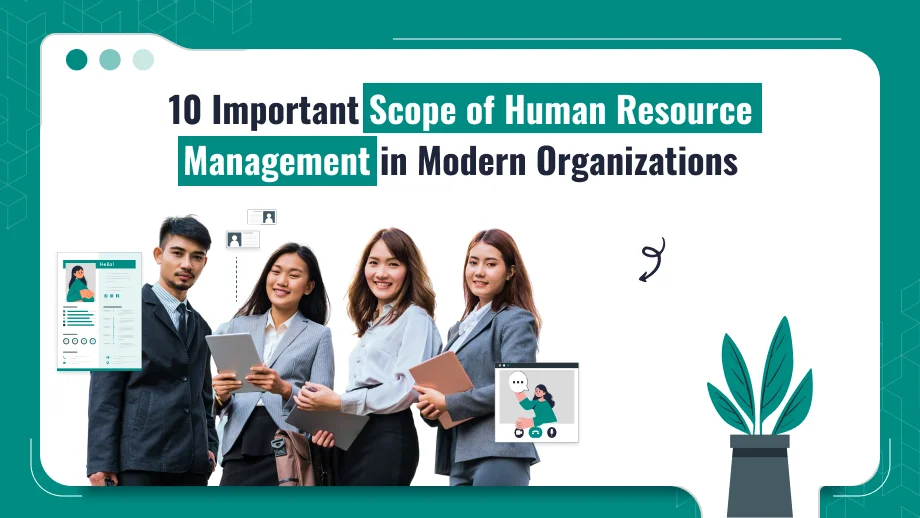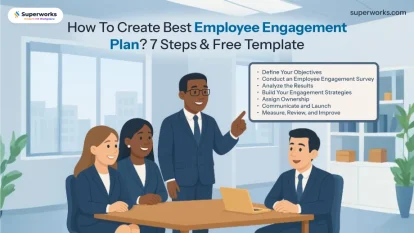Grab a chance to avail 6 Months of Performance Module for FREE
Book a free demo session & learn more about it!
-
Will customized solution for your needs
-
Empowering users with user-friendly features
-
Driving success across diverse industries, everywhere.
Grab a chance to avail 6 Months of Performance Module for FREE
Book a free demo session & learn more about it!
Superworks
Modern HR Workplace
Your Partner in the entire Employee Life Cycle
From recruitment to retirement manage every stage of employee lifecycle with ease.


Seamless onboarding & offboarding
Automated compliance & payroll
Track performance & engagement
10 Important Scope of Human Resource Management in Modern Organizations
- what is the scope of human resource management
- 9 min read
- May 20, 2024

Every business or company has an HR department! This is the only department that can handle the whole department. However, it’s not easy to keep everyone in a large company focused and dedicated. That’s why the scope of human resource management plays a role!
All employees need to work together towards the company’s main goals, which are usually to make a profit and grow. Employee empowerment in HRM takes care of all things related to managing a company’s employees. This includes helping them-
-
Develop their skills,
-
Keeping them motivated,
-
And making sure they stay loyal to the company.
What Is Human Resource Management?
Scope of Human Resource Management (HRM) is the system companies use to manage their workplace & employees. Human resource management refers to building good relationships between the company and its employees.
This includes many functions such as-
-
Hiring new staff,
-
Training them,
-
Managing their performance,
-
Handling pay and benefits,
-
And developing the organization.
Human resource management is essential for a company’s success. No matter how good a company’s products or services are, it needs a productive workforce to achieve its goals. Strategic HR practices lead to higher job satisfaction and increased productivity.
The scope of human resource management ensures that the company has the right talent and skills. It also provides the necessary support and resources for employees to do their jobs well.
For more insights into HRM, check out these sections:
-
HR Scope: Tasks related to managing people.
-
HR Objectives: Basics of what HR aims to achieve.
-
HR Tasks: What HR professionals do every day.
Additionally, HRM helps employees maintain a good work pace, which is often an overlooked function.
What Is The Scope Of Human Resource Management?
Human Resource Management (HRM) covers a wide range of tasks that help an organization succeed. Here’s a look at what HRM involves:
Overview: Scope of Human Resource Management
The scope of HRM is always changing. As companies grow and become more complex, HR has to keep up with different strategies and technologies. At its core, HRM manages employees and the workplace. This includes finding, hiring, and training new workers. HRM also takes care of employee relations, benefits, and payroll.
In recent years, HRM’s role has grown to include strategic human resource management planning and many more. HR now works closely with other departments to make sure the company meets its goals.
As companies continue to evolve and the workforce becomes more global, HRM will keep expanding. HR data needs to be flexible and ready to meet the changing needs of the business.
Also, See: Know These Top 5 Emerging Trends Of HRMS Management System

Are you struggling to perform major HR operations? – Find Superworks!
Manage all the business processes regarding employees and the workplace easily with Superworks HRMS software.
Find the relevant solutions for your business to manage the workplace!
Objectives And Scope Of Human Resource Management
Now that you understand what human resource management (HRM) is!
Now, let’s talk about the objectives and scope of human resources management.
The main objective of HRM is to get the right people for the job. It also aims to develop and maintain a skilled workforce to help the company achieve its goals.
Here are the key objectives of HRM:
-
Hire Right Talent: Find and hire skilled talented employees who can help the company succeed.
-
Improve Work Environment: Create a positive and productive work atmosphere.
-
Use Manpower Efficiently: Make the best use of the available assets.
-
Increase Employee Satisfaction: Build a work culture that maximizes employee happiness.
-
Maintain Good Relationships: Foster good relations between employees and management.
Now, let’s focus on the scope of HRM in Human Resource Management.
Also, See: 10 Must Have Human Resource Policies For Any Organization
A List of 10 Scope of Human Resource Management:
1. Job Analysis
The biggest thing in the office – is to find and retain good employees. For that, you need to do a proper job analysis. This is the work of HR managers and recruiters.
Job analysis and evaluation help the HR practices team grasp the essentials of a job. This includes its responsibilities, the needed qualifications and experience, and the appropriate pay for the role.
The scope of human resource management includes – Job analysis that matches candidates’ skills to the job requirements!
It also considers the company’s budget and allocates resources for each position.
Additionally, job analysis aids in setting up training and development programs for employees in specific roles, ensuring they stay with the company for the long term.
2. Workforce Planning And Recruitment
Workforce planning and recruitment in the scope of strategic Human Resource Management involve evaluating staffing needs.
This recruitment process includes identifying talent gaps and selecting the right candidates.
Effective recruitment ensures the organization has the skills and competencies necessary to meet its goals.
This involves posting job openings on various platforms.
You can consider both online and offline. This also helps to create job descriptions that attract suitable candidates.
The recruitment process includes interviewing candidates who apply. It assigns tasks to assess their skills, and sends offer letters to selected individuals.
3. Employee Onboarding
Onboarding is an important part of Human Resource Management, that helps new hires understand what to expect.
A clear onboarding routine allows HR to give new employees an overview of the company and their daily tasks and responsibilities.
The onboarding process helps new employees get familiar with their jobs. It helps to understand the company better and learn about the company culture and work ethics.
4. Training And Development
Even top candidates need some training, as every employee needs to learn skills to adjust to the office atmosphere as well.
Once employees are in their jobs, it’s important to identify their strengths and weaknesses. This process provides necessary training to ensure job efficiency.
Training and development programs aim to improve employees’ skills, knowledge, and abilities. This development helps employees learn new skills to meet the evolving demands of their jobs.
5. Employee Performance Management
Who doesn’t want to check their employees’ performance? Every company wants clear report regarding that.
Performance management is all about making sure everyone knows what they should be doing, how well they’re doing it, and how they can do better.
One big challenge for HR professionals is keeping up with all the new ideas and ways regarding employee performance.
Human Resource Management (HRM) sets up systems to evaluate how people are doing at work and helps them grow in their careers. Thanks to new technology, such as strategic HRM tools, that helps figure out how their employees are doing and help them improve. But there’s still room for improvement in this area. Then it comes to the Performance management module!
Employee performance appraisal is an ongoing process. That helps figure out how well someone is doing at their job. By evaluating how people are doing, managers can see if they’re meeting those expectations.
6. Employee Compensation And Benefits
Employees should be fairly rewarded at the office.
Compensation and benefits administration ensures employees are fairly rewarded for their work.
Scope of Human Resource Management helps to
-
Manage attendance and payroll,
-
Create pay structures,
-
And manage benefits packages.
This helps attract top talent while ensuring fairness within the company.
HR Life Cycle decides pay based on factors like qualifications, experience, efficiency, and job nature. It also sets rewards and incentives for employees’ contributions.
Attractive compensation and benefits are major motivators for employees. And this is the important scope of human resource management in India.
7. Employee Relations
Employees are the main part of every business and maintaining relations with them is necessary for work culture.
This scope and importance of human resource management involve
-
Creating a productive work environment,
-
Resolving conflicts,
-
Encouraging employees, etc.
It fosters a harmonious workplace culture.
8. Employee Payroll
As we mentioned in above, managing compensation and payroll is important.
Payroll is a key motivator for employees to work, making payroll management a crucial part of Human Resource Management.
This scope of human resource management involves collecting payroll data, and calculating pay and benefits.
Payroll management also ensures compliance with laws to avoid fines. After calculating payroll, HR must deduct taxes and pay them to the government.
9. HR Information Technology
Technology is essential for efficiently managing HR functions. Automation technology such as HRMS software is used for managing the whole workplace. It can handle major operations such as employee management, data management, payroll, and reporting.
These systems make HR tasks easier, improve data accuracy, and support data-driven decisions in the organization.
It is very important to ensure overall organizational success.
10. Employee Engagement
Employee motivation is key for retaining and sustaining staff.
HR is responsible for maintaining the work culture and employees’ well-being. Creating a healthy work environment and motivating employees is part of HR’s role.
As per the scope of hrms solutions, this includes providing non-monetary benefits like medical facilities, insurance, and many more.
Motivated and engaged employees are more productive. Various methods can be used to encourage employees. HR can use methods like recognition, rewards, promotions, events, pay raises, and other monetary and non-monetary incentives.
The Bottom Line
From managing employee recruitment to the exit of employees – all the operations are part of HRM!
As HRM evolves, HR managers need to keep up with the latest HR trends and developments to provide the best service to employees.
Updating the scope of human resource management will continue to grow as organizations see the value of their employees. HR professionals must stay flexible, innovative, and knowledgeable about new trends and technologies. But, it can be easily done with the right tools and technology such as Superworks HRMS software.
As businesses and workplaces keep changing, HRM will remain crucial for driving success!
Also See: Apps to track expenses india | Objectives of hr planning | Reward and recognition programs















